Every annoying adult you deal would have been better off if their parents focused on these important skills. Teaching life skills for kids reduces the chances that they turn into useless adults.
I know parenting is full of stuff you have to do. You have to feed them, earn money to provide for them, deal with logistics, and find time to teach them everything under the sun.
Hopefully this list will make your job a little easier going forward. Save this to come back to over the years. Not all of these skills can be taught simultaneously, it’s a lifelong process.
Always remember, if you’re the type of parent who would look up an article like this, you are doing a great job. You care. Not every day is easy, but you are clearly trying. Don’t be too hard on yourself.
Skip to:
- Basic Chores
- Financial Literacy
- Health and Safety
- Interpersonal Skills
- Practical Life Skills
- Emotional Intelligence
- Future Preparation
- Bonus Skills
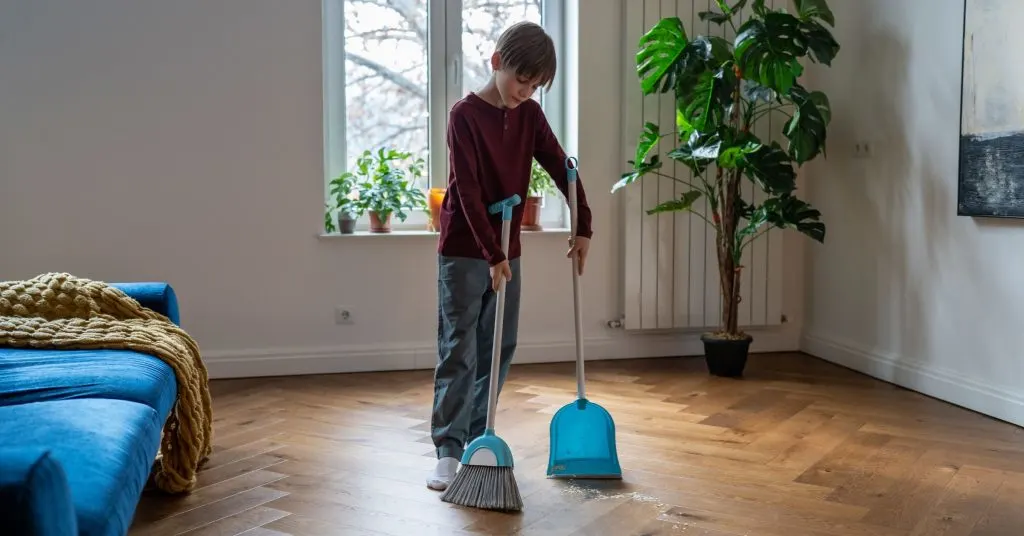
Mastering Basic Chores
Teaching your kids basic chores in their very young age can make life skills second nature for them. From keeping their space tidy to cooking, these tasks build a foundation for independence and responsibility.
1. Cleaning
When you start with simple tasks like wiping down counters or dusting shelves, your kids learn the importance of maintaining a clean environment. Gradually, these chores become a habit. Show them how to use cleaning supplies safely and effectively.
Pro Tip: Make sure your kids know sprays have invisible overspray that could get on nearby food or dishes if they aren’t fully out of the way.
2. Laundry
Laundry is a key skill for ensuring clean clothes, an essential part of independent daily life. Start by teaching your kids to sort laundry by color and fabric type. As they grow more competent, they can learn to operate the washing machine and fold clothes.
3. Cooking Simple Meals
Encourage your kids to help with cooking simple meals. Basic skills like measuring ingredients, following a recipe, and using kitchen appliances safely are integral. Over time, they’ll gain confidence in preparing meals for themselves and the family.
4. Organizing Personal Belongings
Organizing personal belongings teaches kids about taking care of their possessions. You can guide them through decluttering their room, categorizing items, and maintaining an orderly space. This skill aids in reducing clutter and gives them a sense of ownership.

5. Daily Chores
Incorporate daily chores into your child's routine to instill regular upkeep of their living space. These can be simple tasks such as making the bed, putting away toys, and clearing the table after meals. By consistently performing these tasks, your kids will develop basic life skills that benefit their everyday living.
Financial Literacy
Teaching your kids financial literacy is a best way and a crucial part of developing life skills for kids. It arms them with the knowledge to make informed money management decisions and lays the foundation for financial independence as adults.
6. Basic Money Management
You can start teaching your kids the basics of money management by opening a savings account in their name. This hands-on experience offers a practical understanding of how money can grow through interest. Encourage them to set aside a portion of their allowance or any gift money, reinforcing the habit of saving regularly.
7. Understanding Value
Help your children grasp the concept of value by comparing prices and quality of different items. Show them how to weigh decision-making skills when it comes to purchases by discussing things like wants versus needs and short-term satisfaction against long-term benefits.
8. Earning And Saving
To instill a strong work ethic, consider allowing them to start their own business. Learning the economics of managing money and paying themselves is a valuable lesson. Not only do they gain valuable earning and savings skills, but they can become very talented entrepreneurs.
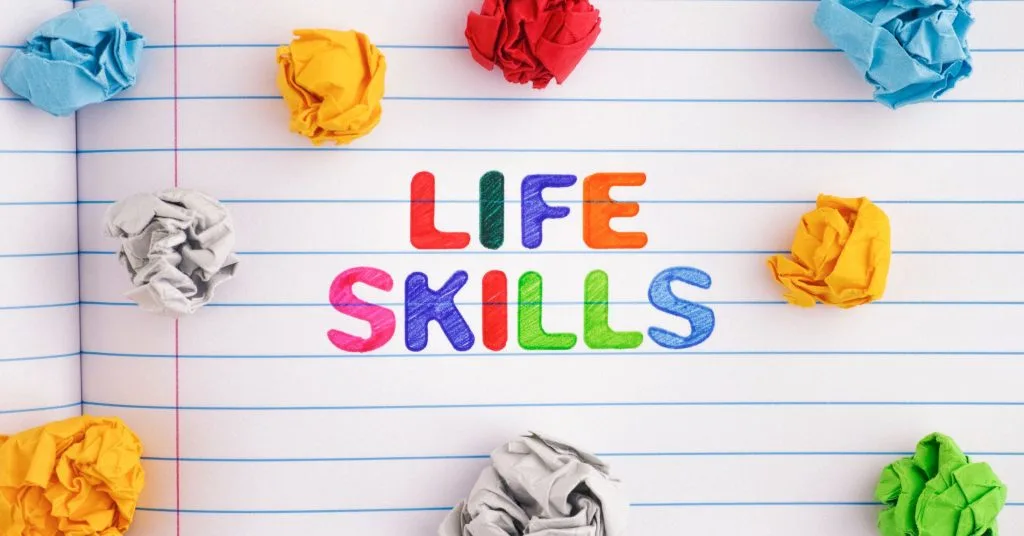
9. Spending Wisely
Teaching kids through the process of spending wisely by involving them in buying decisions, such as groceries or clothes. Teach them to look for deals, use coupons, and compare prices, which not only sharpens math skills but also instills the importance of getting value for money spent.
10. Basic Math Skills
In daily activities, incorporate basic math skills like counting change, budgeting for small purchases, or measuring ingredients for a recipe. These practical applications ensure your child understands the numerical side of money management, critical to their lifelong financial literacy journey.
Health And Safety
Equipping your child with essential health and safety life skills is not jut a good idea but integral to their well-being and development. From personal cleanliness to managing stress, these necessary life skills form a foundation for a healthy lifestyle.
11. Personal Hygiene
Instill the habit of regular hand washing with soap and water, especially before meals and after using the bathroom. Such are some of the best practices. Encourage daily showers or baths and the use of deodorant once appropriate for their age. Teach them about oral health, including brushing teeth twice a day and flossing regularly.
12. Basic First Aid
Ensure your child knows how to clean a cut, apply a bandage, and recognize when an injury requires adult intervention. Teach them emergency numbers and how to call for help. First aid courses are beneficial for older children, providing confidence in handling basic injuries.
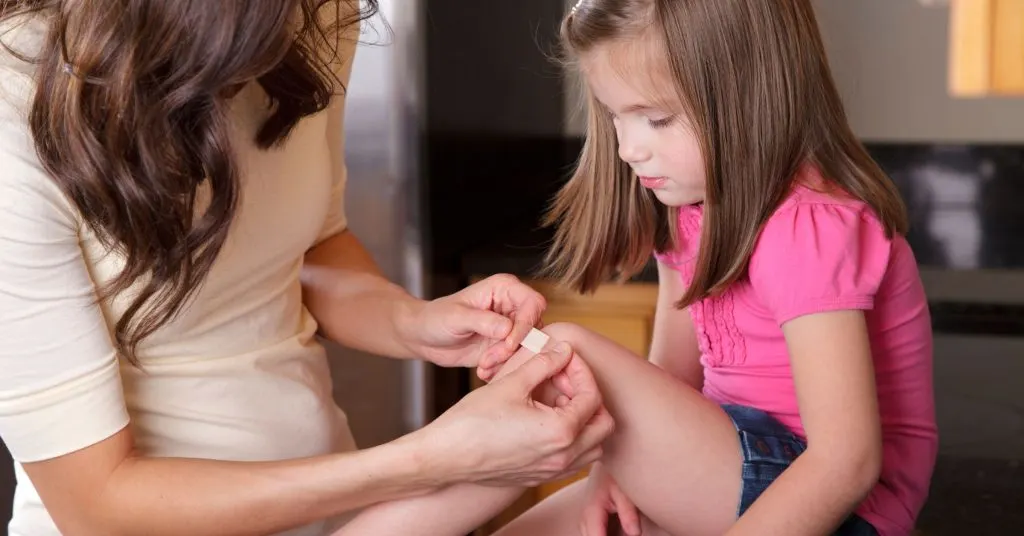
13. Nutrition
Teach the importance of a balanced diet, rich in fruits, vegetables, whole grains, and lean proteins. Create a weekly menu with your child, including healthy snacks. Explain how good nutrition is a core aspect of life skills for kids, tied to their energy levels and overall health.
14. Safety Skills
Help your child understand the significance of wearing a helmet while biking or skating. Emphasize the need for life jackets near water, practicing swimming, and recognizing unsafe and difficult situations. Teach them fire safety, including stop, drop, and roll, and establish a family emergency plan.
15. Stress Management
Show your child healthy ways to cope with stressful situations. Encourage talking about feelings, practicing relaxation techniques such as deep breathing, and taking breaks when needed. Promote physical activities as they are an excellent way to reduce stress and improve mood.
Interpersonal Skills
Interpersonal skills are essential life skills for kids that pave the way for a successful future in personal and professional realms. By nurturing these skills early, you set a foundation for effective communication, respect for others, and the ability to form meaningful connections.
16. Effective Communication
Developing communication skills in children involves more than just talking. Encourage active listening by developing the habit of making eye contact and processing what is being said. Teach your child to express thoughts clearly and confidently, whether it's at school or in a social setting.
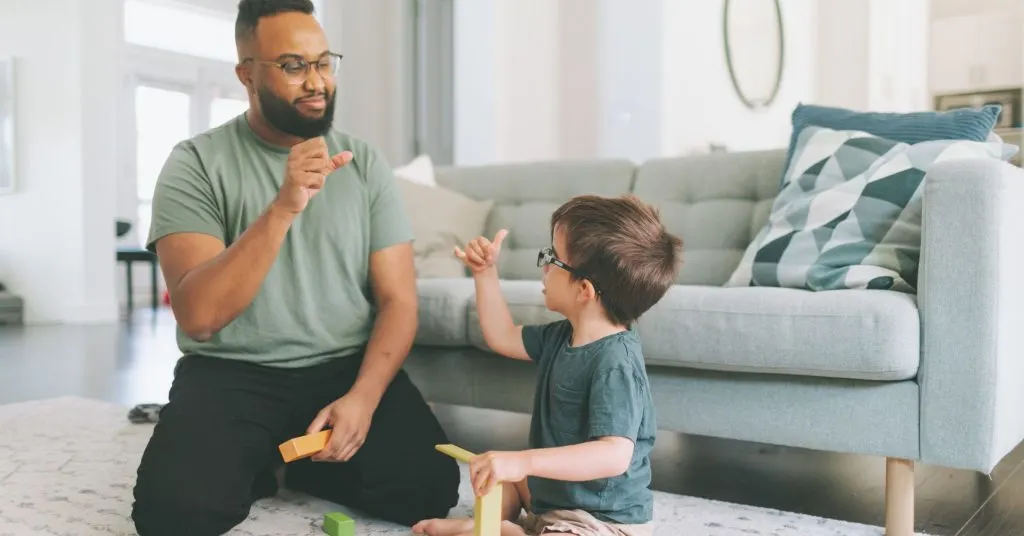
17. Consent And Bodily Autonomy
It's important for kids to learn that they have control over their own bodies. Teach them to ask for permission before physical contact with others and to respect personal boundaries. These lessons are crucial for long term physical safety.
18. Good Manners
Your child's manners are a reflection of their interpersonal skills. Simple phrases like "please," "thank you," and "excuse me," when used appropriately, demonstrate respect and consideration for others.
19. Conflict Resolution
Equipping your child with the ability to resolve disputes is a key interpersonal skill. They should understand how to communicate their viewpoints without aggression and work towards a peaceful solution.
20. Empathy
Empathy is the heart of strong interpersonal relationships. Teach your child to recognize and respond to others' feelings. This ability to empathize contributes to friendships and an understanding of diverse perspectives.
21. Building Strong Relationships
Healthy relationships are built on a combination of all these interpersonal skills. Show your child the importance of trust, mutual support, and positive communication in cultivating strong relationships.
By focusing on these critical areas, you're helping to arm your child with the interpersonal tools they'll need for life's many adventures. They're not just "nice-to-haves," they're non-negotiable life skills for kids.

Practical Life Skills
Instilling practical life skills for kids is essential for their development into capable adults. These skills range from managing time efficiently to critical thinking, and from setting achievable goals to navigating the increasingly digital world we live in.
22. Time Management
Time management is necessary for academic success and personal productivity. Teach your kids to create a daily schedule or use a planner. Encouraging the use of timers or alarms can also help them understand the value of time and how to use it wisely.
23. Critical Thinking
Developing critical thinking skills in children sets the foundation for lifelong learning and and understanding. Encourage them to ask questions, think logically, and evaluate solutions. This will prepare them to tackle complex challenges and make informed decisions.
24. Goal Setting
Goal setting is a powerful skill for kids to learn early on. It teaches them to aspire and strive. Start with small, achievable goals and guide them on creating actionable steps to reach their objectives, underscoring the importance of perseverance and hard work.
25. Navigating The Digital World
Navigating the digital world safely and responsibly is a modern, essential skill. Make sure your kids are educated about internet safety, such as creating strong passwords and recognizing trustworthy sources, which will serve them well throughout their lives.

26. Learning To Drive
For teenagers, learning to drive is a rite of passage and a significant life skill. It’s not just about operating a vehicle, driving teaches responsibility, attention to detail, and spatial awareness.
27. Caring For A House
Knowing how to care for a house involves a variety of tasks from changing furnace filters to basic repairs. By participating in household maintenance, kids learn responsibility and gain a sense of pride in taking care of a house, their own living spaces.
Emotional Intelligence
Emotional Intelligence is a vital set of new life skills for kids that facilitates better self-regulation, understanding of emotions, and interpersonal dynamics. These skills prepare your child to navigate the complexities of social interactions and personal growth effectively.
28. Self-Awareness
Self-awareness is recognizing your own emotions and their impact on your behavior and thoughts. Encourage your child to identify and name their feelings, as this is the first step toward managing them. Use positive self-talk strategies to help them develop a positive self-perception.
29. Resilience
Resilience equips your child to handle setbacks and challenges with determination. Teach them coping mechanisms like deep breathing or breaking problems down into manageable steps. These strategies can transform obstacles into learning experiences.
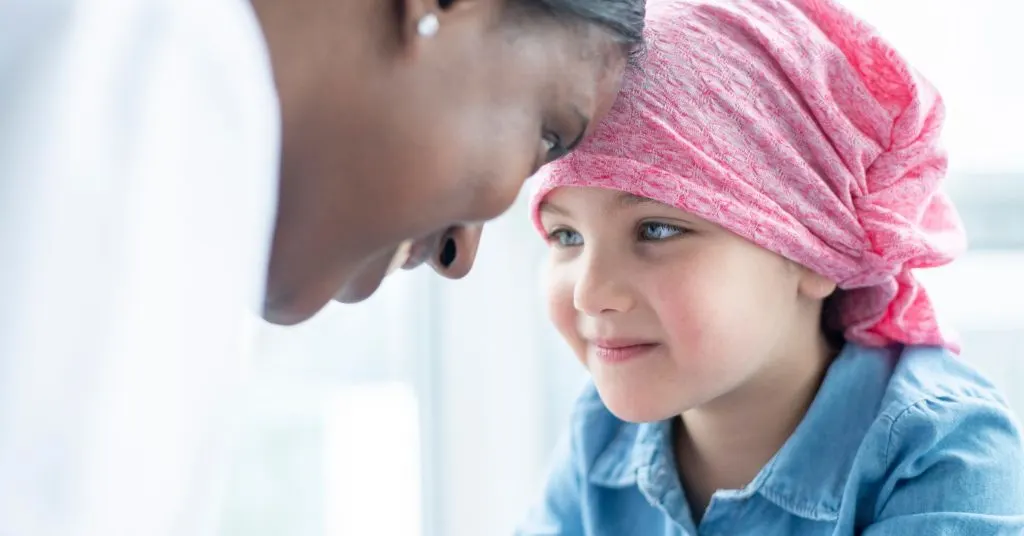
30. Self-Esteem
Building a healthy self-esteem is about strengthening your child's confidence in their abilities. Celebrate their successes, however small, and assure them that making mistakes is a natural part of learning. This can encourage a growth mindset and a stronger belief in their own capabilities.
31. Empathy
Empathy is the ability to understand and share the feelings of others. Role-playing various scenarios can help your child put themselves in someone else's shoes. This skill is crucial for forming meaningful relationships and contributes to a well-rounded emotional intelligence.
32. Decision-Making
Good decision-making skills involve understanding the consequences of actions and weighing options carefully. Encourage your child to think about potential outcomes before making choices, growing a sense of responsibility and critical thinking. This skill is integral to self-governance and independence.
Future Preparation
Life skills for kids are essential tools for building a foundation that supports future success. From excelling academically to navigating independent living, these skills are crucial for your child's journey ahead.
33. Educational Success
To ensure academic success, focus on teaching time management and effective study habits early on. Encourage active participation in their own learning process, which includes asking questions and seeking help when needed. Mastery in these areas can lead to better grades and a positive attitude towards education.
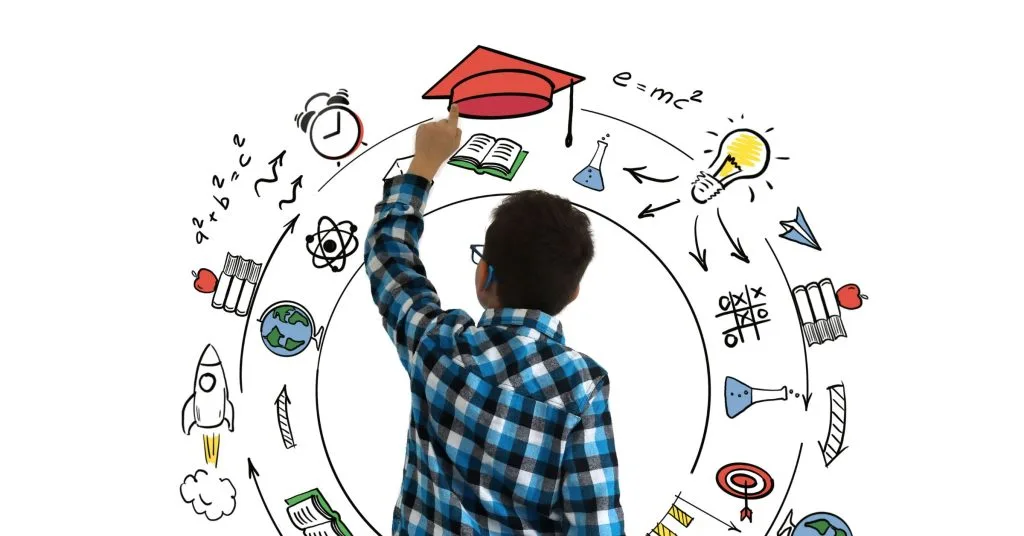
34. Career Options
Help your child understand the vast array of career options available by exposing them to different fields and interests. Highlight the importance of setting goals and developing a strong work ethic. Introduce the concept of networking and the value of internships as they grow older.
35. Exploration
Teach your kids to be curious and excited to learn about other cultures up close and personal. Allow them to pick destinations, plan vacations, and go see new places in person. Value family time abroad by instilling a love for travel.
36. Problem-Solving
Cultivate problem-solving skills by presenting your child with age-appropriate challenges. Encourage them to think critically and to approach problems with a solution-oriented mindset. These skills will help them tackle both simple and complex issues they will encounter in the future.
37. Adaptability
Teach your child to be adaptable by exposing them to new experiences and diverse perspectives. Show them how to navigate change positively and to see failures as opportunities to learn and grow. Adaptability is crucial in a rapidly changing world and can be the difference between thriving and falling behind.
Bonus Skills
In exploring life skills for kids, you'll find an array of abilities that extend beyond the basics. These are the extras that can enrich your child's life, providing a well-rounded foundation for their growth.
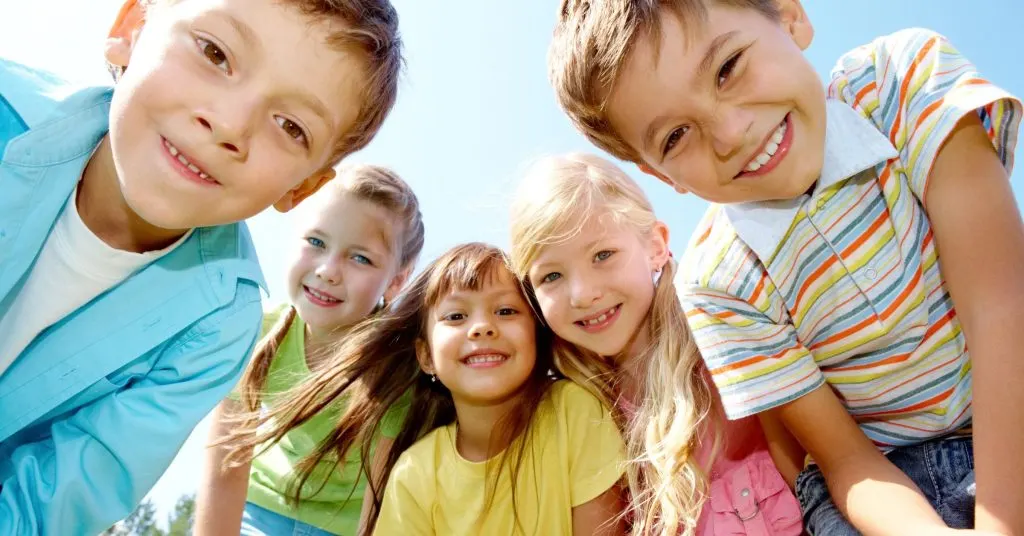
38. Letter Writing
When you teach your child the art of letter writing, you're handing them a personal communication tool that stands out in the digital age. They learn the importance of addressing someone, expressing thoughts clearly, and creating a tangible connection with the recipient.
39. Environmental Responsibility
Environmental Responsibility is a key life skill. Teach your kids to recycle diligently, save water, and respect wildlife. Encouraging outdoor activities helps them appreciate and want to protect their environment.
40. Civic Engagement
Getting involved in community service or local projects can instill Civic Engagement in your children. Show them how voting, volunteering, and participating in civic duties make a difference in society.
41. Artistic Expression
Encouraging artistic expression allows your children to explore their creativity and emotions. Whether through painting, music, or drama, they gain confidence and a medium for self-exploration.
42. Mindfulness
Mindfulness can be a life-changing habit. Teach your kids to stay present, breathe deeply, and approach situations with calmness. It's not just a stress-reliever but also a way to enhance focus and empathy.
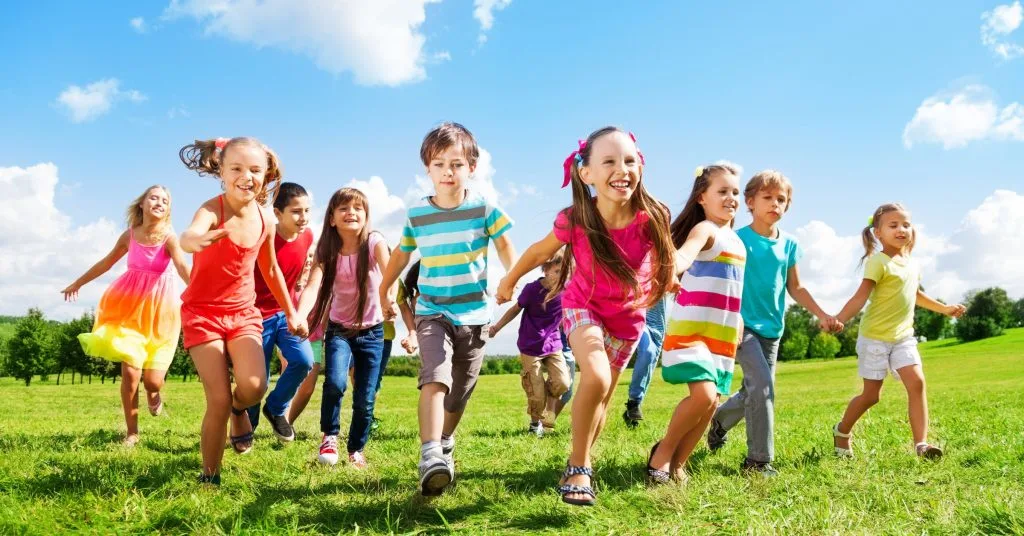
The Lifelong Impact of Teaching Life Skills to Kids
Investing time in developing life skills for kids pays dividends in their journey to adulthood. Good habits formed early become the bedrock of personal and professional success. You enable your children to navigate everyday life with fewer hitches when you impart practical, social, and emotional skills.
Essential skills aren't absorbed in a day. Consistent practice turns lessons into ingrained behaviors. Everyday life presents numerous teaching moments. Use them to show your kids the relevance of what they learn. This approach cements knowledge and demonstrates its application in real life scenarios.
Your future well-adjusted adult child will thank you for teaching these skills early and often. Plus, society will thank you for not raising another entitled crazy person we have to deal with. Everyone's lives improved when parents take them time to teach life skills to their kids before it's too late.

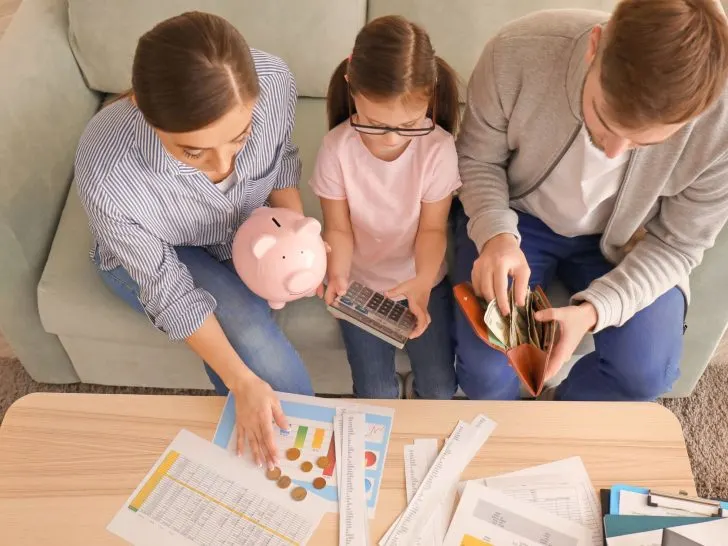

Leave a comment